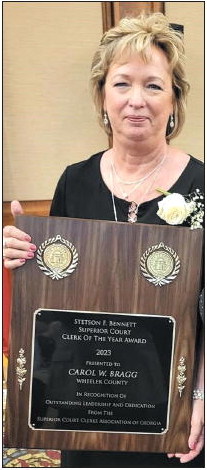continued from page EMC, headquartered ….
continued from page
EMC, headquartered in Toombs County, to serve customers in the EMC service area that were not eligible for services under two previous allocations totaling $29 million.
In October 2021, Altamaha EMC announced plans for a $29 million project that will supply 1500 miles of fiber optic cable to the area. The project will extend from Toombs County to East Dublin and cover Montgomery County, as well as portions of Tattnall, Treutlen and Laurens Counties. The project was funded from two sources, the Federal Communications Commission’s Rural Digital Opportunity Fund (RDOF) and the USDA Reconnect Program.
A partnership between Altamaha EMC and Toombs and Montgomery counties allowed the cooperative to apply for an extra $10 million in funding through the American Rescue Plan Act of 2021 on behalf of these counties.
Work is underway on the broadband network that will provide from 1 to 10 gb/s of service to customers in the service area. “We expect activities to quadruple within the next 10 months,” said Altamaha EMC General Manager Romanous Dotson. With the latest funding, the EMC will eventually be able to offer broadband to everyone in its service area who wants it. “As we progress down the road we will continue to expand into unserved areas. My goal is that every person in our area who wants service will be served.”
In some areas, broadband service is already being offered by other companies. Dotson said the intent of the EMC is not to go in and compete with these companies but to augment what is already being provided to offer more complete coverage.
The EMC’s Assistant Manager George McLendon added, “What’s important is that with Toombs and Montgomery counties working with the EMC almost every person in these areas will be offered the opportunity to receive 1 gig of basic (fiber optic) internet service where it is not available now.” Those areas include pockets within Lyons and Vidalia not eligible under the first two allocations.
A big piece of the funding puzzle was put into place by various communities like Ailey, Uvalda, Mount Vernon and Alston that contributed ARPA funds toward the project. Additional local funds are required to be pledged to completely fund the broadband project. In addition to the state’s award, the Montgomery County Board of Commissioners will grant $1,250,000 of the county’s American Rescue Plan funds to Altamaha Electric Membership Corporation.
On February 1, Montgomery County Commission Chairman Leland Adams, Commissioner Chad Kenney, Commissioner Ginger Morris and County Manager Brandon Braddy joined Senator Blake Tillery, Representative Leesa Hagan and representatives of Altamaha EMC for the announcement that Montgomery and Toombs counties received a total of $5,973,474 to fund the installation of faster and more reliable broadband.
Chairman Adams stated, “The Board of Commissioners and I are excited that faster and more reliable broadband will be installed in Montgomery County. The Commissioners and I appreciate Toombs County’s and Altamaha EMC’s participation and leadership with making this happen as well.
Montgomery County’s partnership with Toombs County and Altamaha EMC strengthened Altamaha EMC’s grant application for these grant dollars. Also, Montgomery County is thankful for Senator Tillery’s leadership in advocating and working to get faster broadband service in Montgomery County and all of rural Georgia. “Representative Hagan has been a strong advocate for broadband service in Montgomery County as well. It was truly a historic day to join them, along with Governor Kemp, representatives of the Altamaha EMC and other state leaders in Atlanta for this announcement. This is a big win for Montgomery County. This broadband project will enhance the quality of life in Montgomery County in so many ways.”
Sen. Tillery, R-19, of Vidalia, was among the members of the Georgia Jobs and Infrastructure Committees appointed by Governor Kemp last June. As Chair of the Senate Appropriations Committee, Tillery sat on both committees.
It was the task of these bipartisan committees to receive applications and make recommendations to the Governor regarding federal coronavirus relief funds allocated to Georgia through the American Rescue Plan. State government entities, units of local government, industries, and nonprofits were eligible to apply for funding. Specifically, the Broadband Infrastructure Committee was responsible for making necessary investment recommendations to provide unserved or underserved locations with faster, more reliable broadband access.
'The volume of applications from all corners of the state proved what we thought we knew: citizens need better broadband options for work, school, and play,' Tillery said. 'The communities and providers who did the detail work of separating out RDOF areas, avoiding overbuild in already served communities, and calculating local and applicant matches to stretch state dollars so more citizens earned these grants. These awards are a giant step toward resolving the technological divide between our urban and rural communities.'
Governor Kemp said, 'I am very proud that Georgia is once again leading the nation in developing collaborative, innovative, and fiscally conservative ways to leverage government funding to positively impact and serve as many Georgians as possible.'
He added, 'I want to thank all of the members on the Broadband Infrastructure Committee as well as the grants team at the Office of Planning and Budget, and the broadband and special projects team at the Georgia Technology Authority for working together to score applications and recommend projects that reflect the greatest needs and interests of hardworking Georgians. We look forward to the positive impact these projects will have once completed.”
The announcement last week represents the initial phase of the rollout. The state is now in a due diligence posture, collecting tangible information and working with grantees to maximize the ability to serve the most Georgians in the highest-need areas. As the due diligence phase wraps up based on final ARPA guidance from the United States Treasury and project awards are finalized, there is potential opportunity to repurpose or leverage other federal funds to address areas that may not have been addressed with these awards, according to the Governor’s announcement.
A press release from the Governor’s office noted, “Due to the hard work and forward thinking of the Legislature, the Department of Community Affairs, and the Carl Vinson Institute of Government, the Georgia Broadband Availability Map is a resource that helped the state identify the necessity of these projects. Leveraging this map, focus was placed on selecting projects that continued from page
will help maintain a level playing field for private sector competition, also taking into respect parallel funding streams available for broadband access or expansion, like the RDOF. Geography was also considered in order to disperse funds in an equitable manner.”
Based on data from the Georgia Broadband Availability Map, 482,374 locations in Georgia are currently unserved (as of July 2021). The projects targeted with these awards could serve 183,615 locations, representing both homes and businesses with faster and more reliable broadband. Slightly over 132,000 of these locations are currently unserved based on state data. In addition to this historic investment in broadband expansion in Georgia, the FCC's RDOF program has awarded $326 million in funding that will also bring service to almost 180,000 unserved locations over the next several years. Due to proximity and connection to the Broadband Infrastructure Committee awards, many of those project timelines are expected to accelerate.






